|
The Workplace Safety & Health (WSH)
Laboratory provides an environment for the study of the fundamentals in shipboard safety particularly in the reas of fire fighting and personal safety. Realistic
installations and equipment of the latest design are in use. It is developed to support courses in:
- Basic fire fighting (principles and practice)
- Advanced fire fighting (strategy and tactics)
- Shipboard safety management
- Air Sampling & Analysis
- Hazardous Materials Incident Response
- Industrial Hygiene & Industrial safety
- Occupational Ergonomics
|
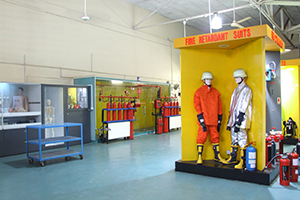 |
|
The Control Engineering Laboratory is equipped with industrial instrumentation and control systems to reinforce classroom lessons in the following areas:
- Process Measurement Technology
- Automatic Feedback Control Systems
- Pneumatic and Electronic Logic Circuits
- Programmable controllers
- Boiler Process Control Systems
- Basic Digital Electronics
|
 |
|
The Boiler House provides a learning environment similar to that found in steam generation plants. It is equipped with two operational boilers and other steam teaching aids to support the following
learning objectives:
- Operations of shipboard auxiliary boilers
- Familiarisation of various boiler mountings
- Familiarisation of modern boiler controls
- Practices for safe and economic operations of steam systems
|
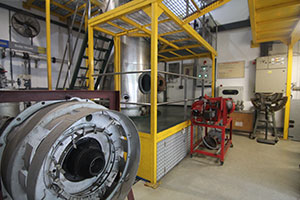 |
|
The Integrated Simulation Centre (ISC) was jointly set up by the MPA and SMA to further enhance the quality and efficiency of maritime training conducted in Singapore using simulators. It is the official venue for MPA
examinations on topics related to maritime simulations. ISC simulators offer different realistic scenarios for training of ship officers and crew in a risk-free environment. Students will experience first-hand state-of-the-art technology
employed for seafarers’ trainings and shipping operations via sessions on the Navigation Bridges and the Engine Room Simulators. Other advanced facilities such as the Dynamic Positioning Offshore
Handling Laboratory and
the Liquid Cargo Handling Simulators which are housed within the ISC also add to the range of maritime training capabilities it offers. Although developed primarily for the training of shipboard personnel, the ISC is also capable of
conducting marine research and development for port planning.
|
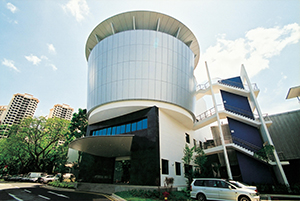 |
|
In the Full Mission Engine Room Simulator, the comprehensive, realistic, interactive and dynamic systems simulate real- world ship propulsion plants. It is housed in a purpose built complex to support
the following learning objectives:
- Exposure to the latest techniques in data acquisition, presentation and control
- Interactive experience with fully integrated and dynamic systems
- Familiarisation with operational routines and procedures
- Team work
- Process analysis and condition and performance monitoring
- Failure management and loss prevention
- Man-machine interfacing
|
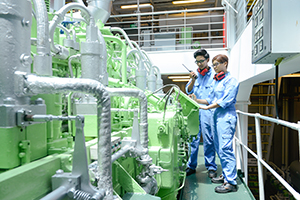 |
|
The Full-Mission Ship-handling Simulator consists of five Navigating Bridges, three Instructor Stations and Briefing/Debriefing Room. The bridges have a horizontal field of view (HFOV) 240 and are fully equipped
with
the latest navigational equipment. All the bridges are fully equipped with stateof- the- art Computer Generated Image (CGI) system to create a highly realistic environment using improved technology of
1080p 120hz LED displays.
The simulator can provide the trainee with all the relevant critical cues and will
enhance their awareness of the need for proper and safe procedures at all times when carrying out the various operations on-board tanker. These
simulations of real-tanker models will enhance their ability to make decisions when experiencing operational problems and solving them, thus promoting safety and protecting the environment.
|
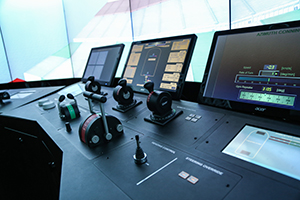 |
|
The e-Navigation Simulator is designed in full compliance with the latest International Maritime Organization (IMO) regulations. The simulation system is able to train students in the use of all shipboard electronic navigation
and communication equipment, which includes:
- ECDIS
- Navigation Aids and the Global Maritime Distress and Safety System (GMDSS)
- The e-Navigation Simulator facilitates the following areas of training:
- ECDIS
- GMDSS
- VTS
- Electronic Navigational Systems (RADAR, ARPA, Compass, Echo Sounder, GNSS, AIS)
|
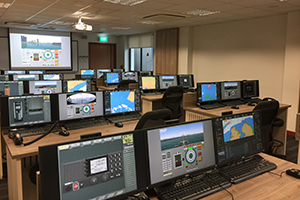 |
The Dynamic Positioning Offshore
Handling Laboratory conducts training for DP Operator serving on-board DP fitted vessels primarily engaged in the Off Shore Oil and Gas Industry. It is accredited to the Nautical Institute, London, as an approved Training Centre. The
laboratory is equipped with 4 bridges of Class B Simulator. Each bridge is configured to the Offshore DP vessel of Class 2 of Navis DP System and equipped with 7 visual channels and touch screen monitors. Training can be conducted using
8 DP ship models.
|
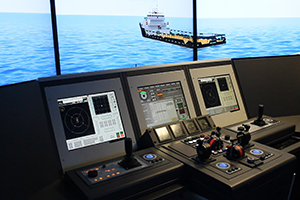 |
|
The Ship Planning Laboratory (SPL) is a 24-station ECDIS and Passage Manager. The SPL prepares students for the transition from navigation using paper chart to using ECDIS to maintain the safety of navigation.
Students
will acquire the proficiency in operating, interpreting and analysing the information obtained from ECDIS. They would also experience the capability and limitations of ECDIS operations.
|
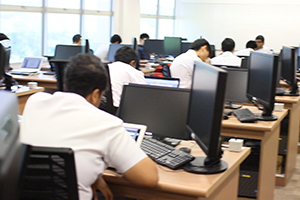 |
|
The Maritime Business Centre is a learning space that will provide the opportunity for students to strengthen
their analytical skills, think critically on the scenario-based (case study) approach, develop them with
strong knowledge of the maritime industry and equip them with IT and problem-solving skills. This learning space, flavoured with maritime culture, will create a lively environment for the students and by the students, lecturers or
mentors including shipping professionals and maritime companies. It will depict the offices of real shipping companies for action, experiential and active learning through role plays of shipping scenarios (case study).
|
 |
|
The Maritime I.T. Laboratory is equipped with the latest ship management software programmes. Also, students can access the online Portnet and Tradenet Systems.
|
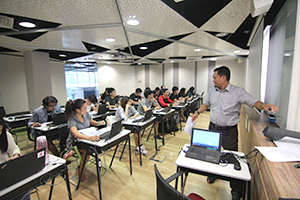 |
|
The Liquid Cargo Handling Simulator (LCHS) models the cargo and ballast handling system/s of existing and modern tankers, their relevant auxiliaries, and the terminal facilities and processes required
for tanker safety operations. The LCHS has the overall ability and capacity to provide simulation, through the use of computer software models, covering all the processes in relation to existing and modern liquid cargo-handling
system, cargo vapour recovery system and ballast handling systems, and other related auxiliary systems, for the types of ships and tanker terminals stated below:
- Multi-grade VLCC
- Multi-grade Petroleum Product Tanker
- Multi-grade Chemical Tanker
- LNG Tanker (Membrane Type& Moss Tank)
- LPG Tanker
|
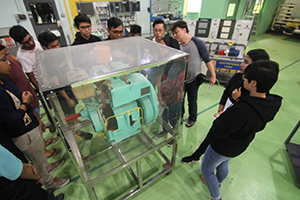 |